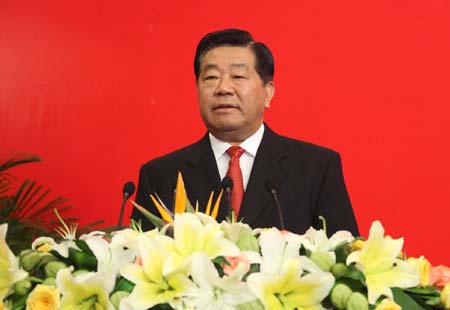
Jia Qinglin, chairman of the National Committee of the Chinese People's Political Consultative Conference, makes a speech at the closing ceremony of the fifth Cross-Straits Economic, Trade and Culture Forum in Changsha, capital of central China's Hunan Province, July 12, 2009. (Xinhua/Xing Guangli)
CHANGSHA, July 12 (Xinhua) -- The fifth Cross-Straits Economic, Trade and Culture Forum closed here Sunday with Chinese mainland and Taiwan participants agreeing to promote cultural exchanges and educational cooperation across the Taiwan Straits.
Authorities of both sides should "discuss and sign agreements on cultural and educational exchanges" to set up a mechanism for collaboration, the proposal read.
Relevant institutions and scholars across the Straits should conduct research and make plans for the negotiation on the agreement, it said.
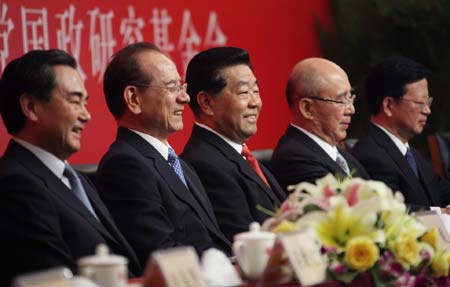
Jia Qinglin (C), chairman of the National Committee of the Chinese People's Political Consultative Conference, attends the closing ceremony of the fifth Cross-Straits Economic, Trade and Culture Forum with Kuomintang (KMT)'s chairman Wu Poh-hsiung (2nd R) in Changsha, capital of central China's Hunan Province, July 12, 2009. (Xinhua/Xing Guangli)
Mainland and Taiwan media institutions should be allowed to set up resident bureaus on each other's side at an early date to deepen information exchange, it proposed.
The written language used on both sides of the Straits belongs to the same system, the proposal said. The two sides should acknowledge the commonality of their language.
Scholars should cooperate in developing software to help bridge language gaps between simplified and traditional Chinese characters, it proposed.
The proposal called on cultural institutions on both sides to enhance conservation of cultural relics.
The two sides could also use cultural resources to jointly create top brand names, foster cultural market and promote culture industries, as well as set up criteria to step up intellectual property rights protection, it said.
Interaction in the broadcast, film and television sector should also be deepened and more joint projects in film and TV should be encouraged, it suggested.
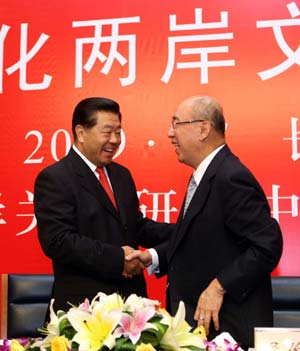
Jia Qinglin (L), chairman of the National Committee of the Chinese People's Political Consultative Conference, shakes hands with Kuomintang (KMT)'s chairman Wu Poh-hsiung at the closing ceremony of the fifth Cross-Straits Economic, Trade and Culture Forum in Changsha, capital of central China's Hunan Province, July 12, 2009. (Xinhua/Xing Guangli)
The proposal also encouraged and supported intercollegiate communications and cooperation between mainland and Taiwan universities, such as student exchange programs and acknowledgement of credits.
Authorities should also support Taiwan companies in exploring the mainland market to seek better development.
Both sides could jointly develop technologies and products in the fields of energy conservation and new energy, it proposed.
Jia Qinglin, chairman of the National Committee of the Chinese People's Political Consultative Conference, made a speech at the closing ceremony.
He said "The forum not only pointed out why the two sides should push forward cultural and educational exchanges and cooperation, but answered how to achieve the goal."
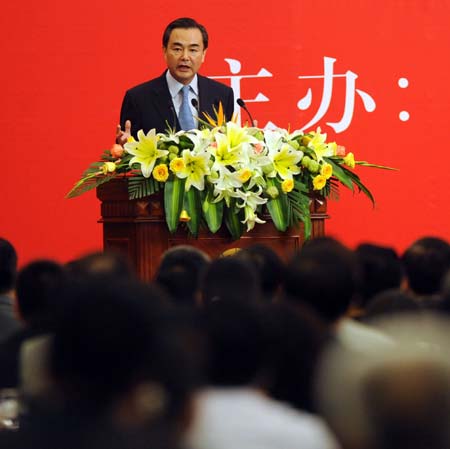
Wang Yi, director of the Communist Party of China (CPC) Central Committee Taiwan Work Office, speaks at the fifth Cross-Straits Economic, Trade and Culture forum held in Changsha, capital of central China's Hunan Province, July 12, 2009. The forum closed here Sunday. (Xinhua/Li Ga)
The joint proposal was an important decision-making reference for authorities on both sides.
The two sides should continue to hold this forum and make it even better in the future, Jia said.
Kuomintang (KMT)'s chairman Wu Poh-hsiung said the forum offered a platform of direct dialogue for representatives in the culture and education sectors across the Straits.
According to Wu, less than 25 percent of the participants from Taiwan at this forum are had a KMT a background.
"We'd like more people from a wider range of sectors to attend this forum," he said. "It'll attract more people from other parties, people with no official background and scholars and experts."
Wang Yi, director of the Communist Party of China Central Committee Taiwan Work Office, said the forum received more attention and support from both sides and exerted more influence on cross-Strait relations.
"The forum is open and comprehensive... People are welcome here to sit together and have peaceful discussion as long as they agree to improve the cross-Strait relations and do something concrete for people from both sides," Wang said at the closing ceremony.
"In the future, we will keep welcoming more people from Taiwan to discuss with us various issues on the improving cross-Straits exchange," he added.
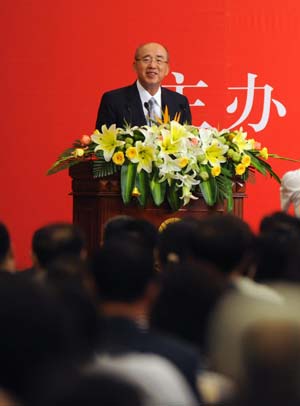
Kuomintang (KMT) Chairman Wu Poh-hsiung speaks at the fifth Cross-Straits Economic, Trade and Culture forum held in Changsha, capital of central China's Hunan Province, July 12, 2009. The fifth Cross-Straits Economic, Trade and Culture forum closed here Sunday.(Xinhua/Li Ga)
In the past two days, about 530 participants, 270 from Taiwan, discussed how to inherit and innovate the Chinese culture, promote cross-Straits cultural cooperation, and extend cross-Straits educational exchanges and cooperation.
